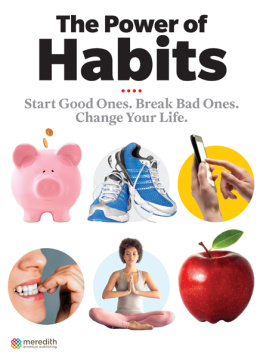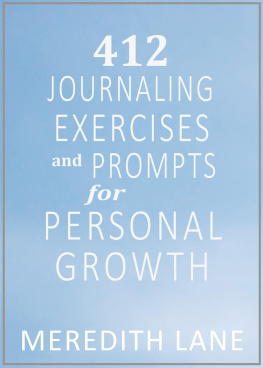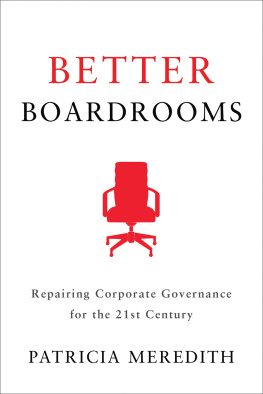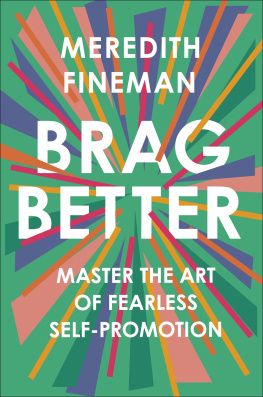Meredith Premium Publishing. - Power of habits.
Here you can read online Meredith Premium Publishing. - Power of habits. full text of the book (entire story) in english for free. Download pdf and epub, get meaning, cover and reviews about this ebook. City: Place of publication not identified, year: 2021, publisher: Meredith Corporation, genre: Romance novel. Description of the work, (preface) as well as reviews are available. Best literature library LitArk.com created for fans of good reading and offers a wide selection of genres:
Romance novel
Science fiction
Adventure
Detective
Science
History
Home and family
Prose
Art
Politics
Computer
Non-fiction
Religion
Business
Children
Humor
Choose a favorite category and find really read worthwhile books. Enjoy immersion in the world of imagination, feel the emotions of the characters or learn something new for yourself, make an fascinating discovery.
- Book:Power of habits.
- Author:
- Publisher:Meredith Corporation
- Genre:
- Year:2021
- City:Place of publication not identified
- Rating:4 / 5
- Favourites:Add to favourites
- Your mark:
- 80
- 1
- 2
- 3
- 4
- 5
Power of habits.: summary, description and annotation
We offer to read an annotation, description, summary or preface (depends on what the author of the book "Power of habits." wrote himself). If you haven't found the necessary information about the book — write in the comments, we will try to find it.
Power of habits. — read online for free the complete book (whole text) full work
Below is the text of the book, divided by pages. System saving the place of the last page read, allows you to conveniently read the book "Power of habits." online for free, without having to search again every time where you left off. Put a bookmark, and you can go to the page where you finished reading at any time.
Font size:
Interval:
Bookmark:

The Power of Habits
Start Good Ones. Break Bad Ones. Change Your Life.
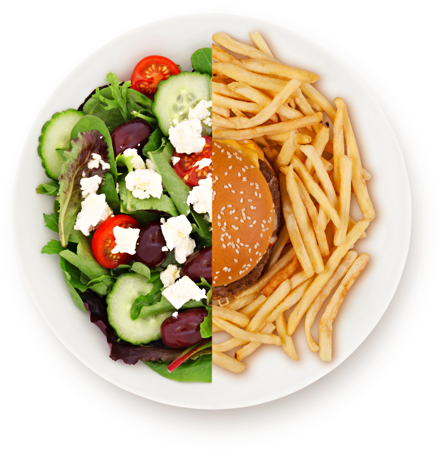
Contents

CHAPTER 1

CHAPTER 2

CHAPTER 3

INTRODUCTION
CREATURES OF HABITS
The virtue of forming good habits has long been recognized and with it a beautiful paradox: the less you think, the more you free your mind
BY COURTNEY MIFSUD

BARACK OBAMA organized every aspect of his day as president so that routine decisions took as little cognitive energy as possibleallowing him to focus on the high-stakes decisions. Youll see I wear only gray or blue suits, Obama told Vanity Fair in 2012. Im trying to pare down decisions. I dont want to make decisions about what Im eating or wearing. Because I have too many other decisions to make. He referred to research that shows the simple act of making a decision degrades ones ability to make further decisions, and noted thats why shopping can be exhausting. The presidents advice: remove from your life the day-to-day problems that consume most people for meaningful parts of their day. You need to focus your decision-making energy. You need to routinize yourself. You cant be going through the day distracted by trivia.
Reflections on the role of habits in our intellectual lives pre-dates Obamaby a couple of millennia and more. Wrote Aristotle: Some thinkers hold that it is by nature that people become good, others that it is by habit, and others that it is by instruction. In his view, habits revealed and defined a persons character.
When Alexander Hamilton co-authored The Federalist Papers , he mused on how to influence citizens to obey the federal laws of a republic in its infancy. He stated that man is very much a creature of habit. Hamilton theorized that if federal law permeated matters at the state level, it would become a part of everyday life. The more it circulates through those channels and currents in which the passions of mankind naturally flow, the less it will require the aid of the violent and perilous expedients of compulsion.
In 1887, the psychologist and philosopher William James wrote about the same tenets that Obama utilizes, in Habit a brief treatise on how our behavioral patterns shape who we are. According to James, habits shape what we often refer to as character and personality. When we look at living creatures from an outward point of view, one of the first things that strike us is that they are bundles of habits, wrote James. In wild animals, the usual round of daily behavior seems a necessity implanted at birth. In animals domesticated, and especially in man, it seems, to a great extent, to be the result of education. The habits to which there is an innate tendency are called instincts; some of those due to education would by most persons be called acts of reason. It thus appears that habit covers a very large part of life.
James begins his treatise with a scientific and physiological account of the brain and neurobiology, touching on the notion of neuroplasticity a century before it became a hallmark of modern neuroscience, and he presents this definition: Plasticity... in the wide sense of the word, means the possession of a structure weak enough to yield to an influence, but strong enough not to yield all at once.
Modern neuroscience defines neuroplasticity as the ability of neural networks in the brain to change through growth and reorganization throughout an individuals life. These types of changes include systematic adjustments such as cortical remapping, which affects our sensory and motor systems. Circuit and network changes that result from learning a new skill, psychological stress and environmental stimuli are all examples of neuroplasticity at work. Neuroscientists once thought that plasticity only manifested during childhoodwhich makes Jamess work so groundbreaking. But researchers in the second half of the 20th century found that, although the developing brain is more amenable to change than the adult brain, there are many aspects of the adult brain that are plastic throughout ones life.
James underscores the importance of building habits early through education. We must make automatic and habitual, as early as possible, as many useful actions as we can, and guard against the growing into ways that are likely to be disadvantageous to us, as we should guard against the plague. The more of the details of our daily life we can hand over to the effortless custody of automatism, the more our higher powers of mind will be set free for their own proper work, wrote James. There is no more miserable human being than one in whom nothing is habitual but indecision, and for whom the lighting of every cigar, the drinking of every cup, the time of rising and going to bed every day, and the beginning of every bit of work, are subjects of express volitional deliberation.
Modern day researchers would agree with James that just because the adult brain can change and shift, doesnt mean that its easy to do so. Old behaviors can be hard to shift and new behaviors take time to develop. But that does not mean that the endeavor is out of reach.
Old behaviors can be hard to shift and new behaviors take time to develop. But that does not mean that the endeavor is out of reach.
In Good Habits, Bad Habits , the social psychologist Wendy Wood builds on the idea of automating ones habitspartly as a way to protect and exert control over our subconscious selves. Scientists have only recently begun to unravel the multifaceted nature of our selves and to identify our resulting biases and preferences. With this understanding, we can never fully undo these influences, but we can account for them when we act. Our own behavior springs from some of the most mysterious, deeply hidden, and (until recently) unrecognized sources of irrationality, Wood writes. We need to stop overestimating our rational selves and, instead, come to understand that we are made up of deeper parts, too. We can think of these other parts as whole other selves, just waiting to be recognizedand given the command to get to work.
Wood explains that humans have the tendency to overestimate the decision-making aspect of habits, and that instead we ought to channel the brains plasticity to make changes that become automatic. A brain scan of someone learning a task shows activity in the prefrontal cortex and the hippocampus, networks associated with decision-making. But when a learned task is repeated, the brain activity on the scan in the areas of the putamen and the basal ganglia is what Wood refers to as the rudimentary machinery of our minds. That is where a habit is formed.
To convince the brain to update its models of the world, and ones reactions to that world, requires repetition. Your morning commute is a culmination of habits formed through constant repetition. When you get into a car, you dont need a second thought about buckling the seat belt. Your hand places the key in the ignition without your deciding to do so. Checking your blind spots is a survival mechanism that is second nature.
Next pageFont size:
Interval:
Bookmark:
Similar books «Power of habits.»
Look at similar books to Power of habits.. We have selected literature similar in name and meaning in the hope of providing readers with more options to find new, interesting, not yet read works.
Discussion, reviews of the book Power of habits. and just readers' own opinions. Leave your comments, write what you think about the work, its meaning or the main characters. Specify what exactly you liked and what you didn't like, and why you think so.

